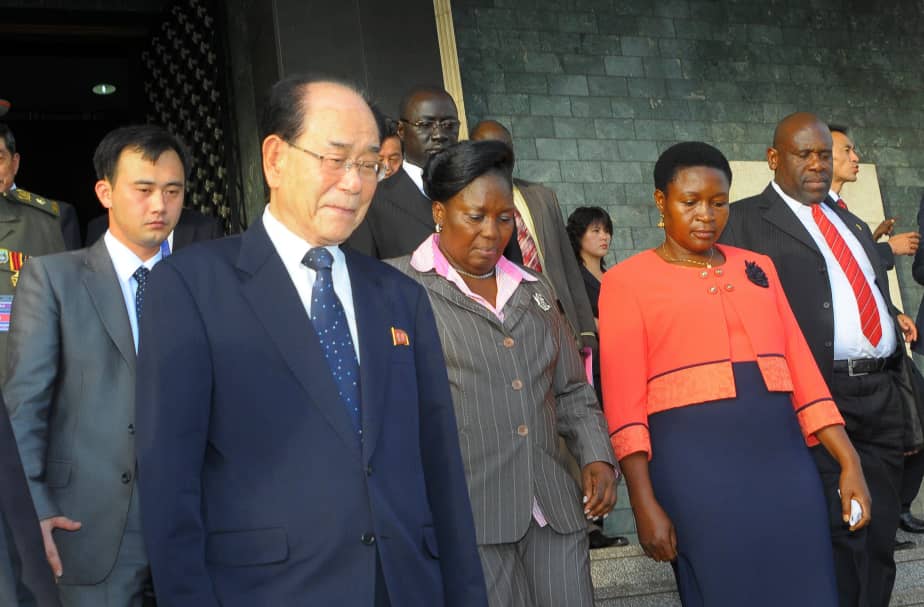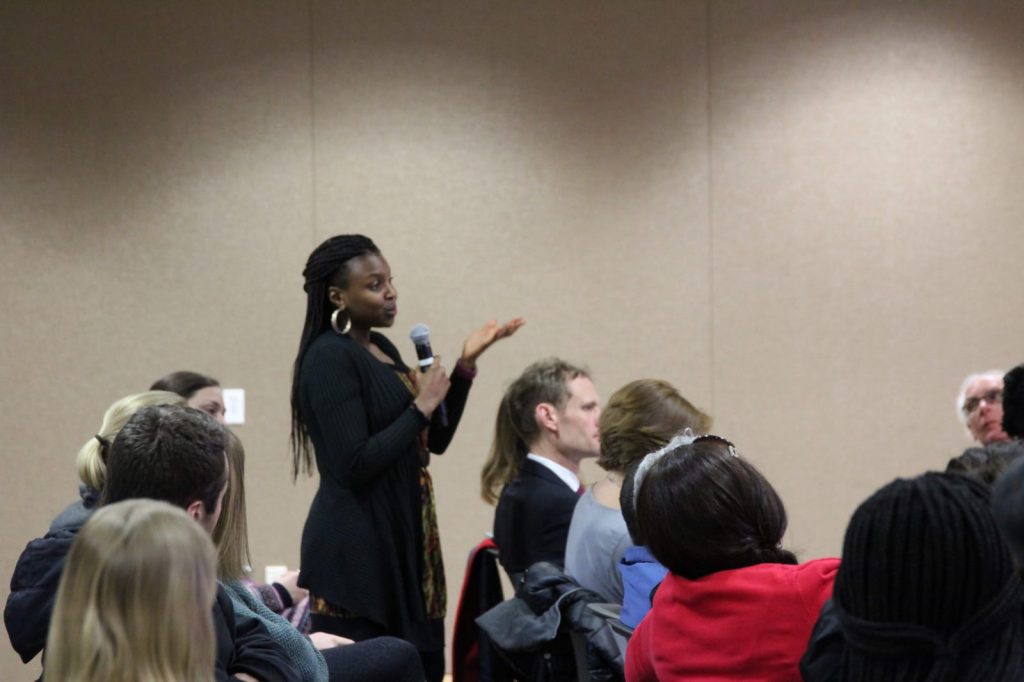Uganda: North Korea’s African Ally
A decades-long relationship continues to flourish, despite increasing pressure from UN sanctions.
Following Uganda’s independence in 1962, the landlocked Central African country has suffered from multiple civil wars and guerrilla movements. One of those brought Idi Amin, a tyrannical dictator, into power in 1971. During his presidency, Uganda first developed relations with North Korea. The relations between the two countries have strengthened during the Ugandan presidencies succeeding Amin until today.

In this photo taken Oct. 30, 2014, Kim Yong Nam, foreground-left, then head of North Korea’s parliament, is escorted into Uganda’s parliament by its Speaker Rebecca Kadaga, center, Commissioner Rosemary Seninde, center-right, and Uganda’s Foreign Affairs Minister Asuman Kiyingi, right, in Kampala, Uganda. Credit: AP Photo
The first high-level cooperation between Uganda and North Korea was recorded in April of 1972 when a high-level military delegation representing the Idi Amin government partook in military celebrations in Pyongyang. During this visit, three agreements were reached between Uganda and North Korea, covering military exchanges, sales of weaponry, and exploring the potential of opening a military construction plant in Uganda.
Throughout Amin’s time in government, which lasted from 1971 to 1979 ,Uganda’s relationship with North Korea deepened, focusing on military assistance. Interestingly, the cooperation did not cease when Idi Amin was forcibly removed from his position as the Ugandan president in 1979.
Subsequently, Milton Obote, the very man that Idi Amin had ousted in a coup d’état nearly a decade earlier, again became president of Uganda. Almost immediately after Obote’s retaking the presidency, the security situation in Uganda began to deteriorate as the National Resistance Army (NRA) began the Bush War in an attempt to remove Obote. This security threat is believed to be one of the motivations behind Obote’s “goodwill visit” to Pyongyang at the end of 1981. The visit resulted in multiple cooperation accords in a variety of fields including education, technology, culture, and most importantly, the military.
Obote eventually lost the Bush War. In January of 1986 forces loyal to Yoweri Museveni stormed the Ugandan capital, Kampala. Only a week after overrunning Kampala, Museveni was sworn in as president of Uganda. In his inauguration speech he urged all members of the Ugandan military that had been loyal to the National Liberation Front (NLF) to remain in the Ugandan army.
While Obote had fled the country, his military largely remained intact and was now under the control of Museveni. In gaining control of the Ugandan military, Museveni gained control of swaths of North Korean weaponry that the Ugandan military had acquired under his two predecessors. This led to Museveni requesting that North Korean officials travel to Uganda and provide training on how to utilize North Korean weaponry.
In 1988 Pyongyang began to give Ugandan police training in martial arts and assisted in the development of a marine unit. The cooperation between North Korea and Uganda was not considered unusual, as during the Cold War, many Western and Eastern allied countries alike attempted to win favor with various African states through diplomatic and security engagements. Following the collapse of the Berlin Wall in 1989, however, many countries ceased support for the African states whom they had supported for years, if not decades.
This was not the case regarding the relationship between the government of Museveni in Uganda and Pyongyang. The cooperation between Uganda and North Korea continued to deepen. Further, Museveni visited Pyongyang in 1990 and 1992 and met with Kim Il Sung.
While North Korea continued providing assistance to Uganda for both marine units and local police personnel, the cooperation between the two countries began to expand into arms development. This is due to the fact that in the 1990s the government of Uganda placed on emphasis on developing a domestic arms production capability to reduce its reliance on foreign military assistance
This led to Uganda opening the now infamous Nakasongola factory in 1996, located in Central Uganda. At the outset the factory produced landmines, bullets, and firearms. Eventually it expanded its capabilities to the repair and construction of medium-sized weaponry, including tanks. Several years after its opening, it was reported that North Korean along with Chinese assistance was instrumental to the operations of the plant. Reports of North Korean involvement were supported by residents of the area, as locals often spoke of the presence of North Korean workers.
Suspicion regarding North Korean involvement at the Nakasongola factory increased after the United States began to cooperate with Ugandan in the “Global War on Terror” in the 2000s. Uganda denied inspectors from the United States and the United Nations permission to enter the plant. In 2007, Uganda permitted entrance to such inspectors but only allowed them to view a small portion of the factory. Beginning in 2004, the United States began requesting to view the classified budget of Uganda, assuming it would contain information about security cooperation with North Korea.
Washington ceased those requests in 2007, however. While the administration of then-President George W. Bush placed a large emphasis on combating the threat of a nuclear North Korea, its largest priority was the war on terror. Therefore, it is logical to draw the conclusion that the United States was not willing to lose one of its foremost African partners in the war on terror because of Uganda’s ties with North Korea.
The suspicion surrounding Uganda’s military cooperation with North Korea was only expanded after the passage of United Nations Security Council Resolution 1874. The resolution, which passed in June of 2009 in response to North Korea’s nuclear tests, banned all military imports from the country. This resolution directly affected Uganda, as such imports formed the bulk of its cooperation with North Korea. Defying the resolution, Uganda continued cooperation with North Korea, as outlined in a 2010 report form the UN panel of experts on the enforcement of sanctions.
While violations of Resolution 1874 were done in a covert manner, Uganda continued to publicly demonstrate its relations with North Korea. In June 2013, North Korean Vice Minister for People’s Security Ri Song Chol traveled to Uganda. The visit focused on measures of domestic security cooperation. The two sides also discussed collaboration to end the “housing crisis” that was facing Ugandan police, as Pyongyang claimed that it had successfully constructed barracks to house officers. Subsequently, Ugandan Vice President Edward Kiwanuka Ssekandi traveled to Pyongyang as a guest of honor at the 60th Anniversary of the Korean War Armistice in 2013.
Over a year later, the then-president of the Presidium of the Supreme People’s Assembly, Kim Yong Nam, arrived in Kampala for a four-day visit. During this visit, Museveni praised cooperation between the two countries. Kim stated that the purpose of his visit to the country wads to deepen the historical ties between the two countries and delivered a message to Museveni from Supreme Leader Kim Jong Un. The observable cooperation between North Korea and Uganda, which oftentimes was in violation of sanctions, did not go unnoticed in Seoul. The conservative government of Park Geun-hye, which took power in February 2013, took particular interest in Uganda-North Korea relations.
This was made visible when Park visited four sub-Saharan African countries in the summer of 2016. Park became the first South Korean president to visit Uganda during the trip. During her visit, more than 10 agreements were signed between the two countries. These agreements were signed on the condition that Uganda end its cooperation with North Korea, which Uganda reluctantly agreed to do. The halt in cooperation was certified when the Ugandan Foreign Minister Sam Kutesa told a Ugandan broadcaster that the country was officially ending all cooperation with North Korea.
The pressure on Uganda to fully eliminate its cooperation with North Korea only increased in January 2017, when the Trump administration assumed office and shifted U.S. strategy regarding Pyongyang. Specifically, it sought to force all countries to universally cease cooperation with North Korea. This aim was solidified with the passage of United Nations Security Council Resolution 2371 in August of that year, which prohibited commercial and military exchanges with North Korea.
North Korea was a topic of concern during the 72nd session of the UN General Assembly that convened one month after the passing of Resolution 2371. Therefore, heads of state, including President of Uganda Yoweri Museveni, addressed the subject in their remarks. Museveni specifically stated that Uganda was abiding by the UN sanctions on North Korea, but also expressed his fondness for the country and the cooperation they had in the past. Museveni stated “On the small issue of enforcing sanctions against North Korea, Uganda is in compliance. We do not have to trade with North Korea. We are, however, grateful that, in the past, the North Koreans helped us to build our tank forces.”
Uganda continued to lay out evidence that it was ending its decades-long partnership with North Korea. Uganda submitted a report to the UN Security Council in January of 2018 that outlined multiple actions it had taken to curb ties with North Korea. The report stated, “The Directorate of Citizenship and Immigration has canceled the entry permits of 9 doctors and 14 air force instructors from North Korea,” and emphasized that “All defense contracts have been terminated.” It is worth noting that some approached these claims with great skepticism, as Uganda has had a poor record of implementing United Nations Security Council Resolutions that run counter to what it perceives as its interests.
The skepticism surrounding Uganda’s commitments to cease cooperation with North Korea was validated in December 2018. A detailed account published by The Wall Street Journal outlined how Uganda continued to cooperate with North Korea, and in doing so violated UN sanctions. The article quoted an officer in the Ugandan Defense Forces as saying “we never ended our ties” and claims that soldiers in the Ugandan military as under strict orders not to speak of, nor take pictures of, the North Koreans.
This same report revealed in depth how cooperation between Uganda and North Korea also continued outside of the military realm. North Korean mining and construction companies with operations in Uganda changed their registration in Uganda’s official records to Chinese or simply “foreign” while continuing to operate, and North Korean personnel remained in Ugandan hospitals.
The notion that Uganda is not complying with UN-mandated sanctions on North Korea is not an illogical one. For nearly half a century, Uganda has depended its cooperation with North Korea in a variety of fields. Following the commencement of negotiations between the United States and North Korea in 2018, a multitude of countries have loosened their compliance with the UN sanctions regime. Therefore, it would not be a stretch to assume that Uganda will continue to deepen its cooperation with North Korea, especially as the Trump administration resumes its negotiations with Pyongyang over denuclearization.
Read the original of this report, including embedded links and illustrations, on THE DIPLOMAT site.
No related posts.


